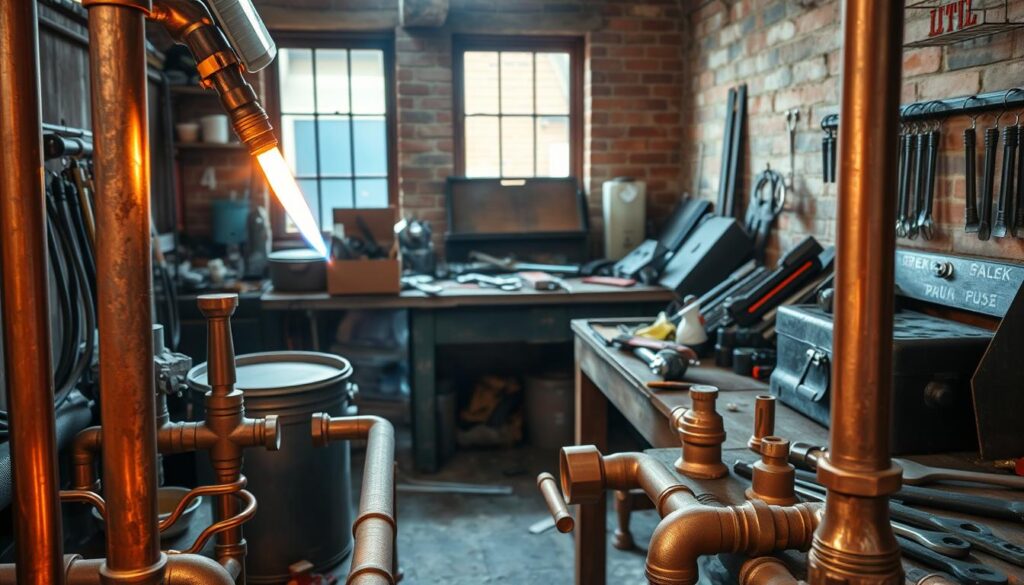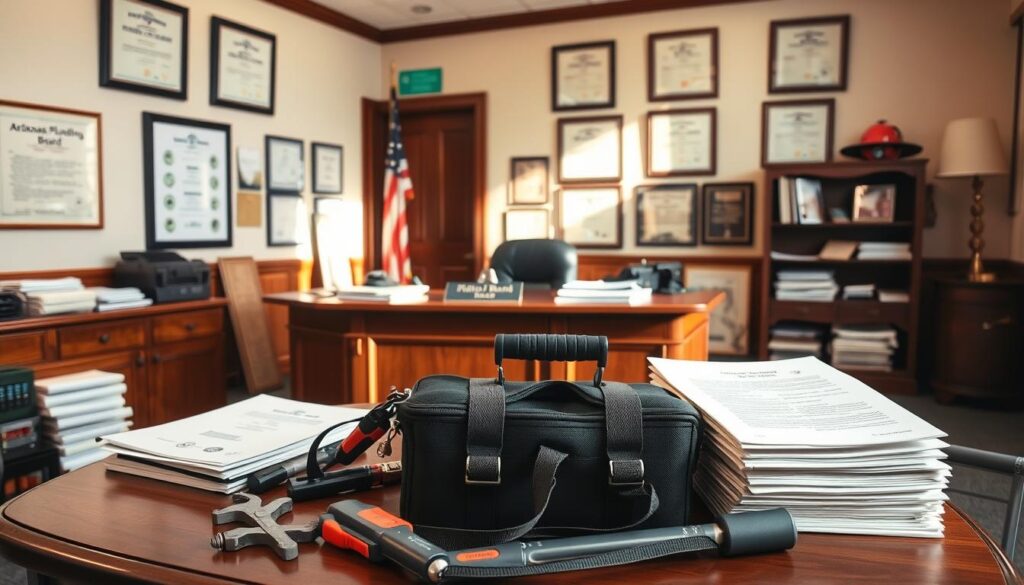Affiliate Disclosure
Plumber Guide Guys is a participant in the Amazon Services LLC Associates Program, an affiliate advertising program designed to provide a means for sites to earn advertising fees by advertising and linking to Amazon.
How to Become a Plumber in Arkansas? Did you know Arkansas has 3,520 professional plumbers? They play a key role in the state’s infrastructure. Learning to be a plumber in Arkansas can lead to a stable and rewarding career.

Plumbing is a vital trade with job security and good pay. If you’re thinking about becoming a plumber in Arkansas, you’ll join a field that’s essential for buildings and repairs.
To become a skilled plumber in Arkansas, you need training, apprenticeships, and certifications. This guide will show you the steps, needs, and chances in the plumbing world in the state.
Key Takeaways
- Plumbing offers a stable career with strong job market demand
- Requires structured apprenticeship and professional training
- Competitive wages and possible career growth
- Multiple certification levels available in Arkansas
- Essential role in maintaining critical infrastructure
Table of Contents
Overview of Plumbing Career Opportunities in Arkansas
The plumbing industry in Arkansas is booming. It offers great career chances for those interested in becoming arkansas plumbing contractors. You’ll get to use your technical skills and hands-on abilities in a rewarding job.
Job Market Landscape
Arkansas is a great place for plumbers and arkansas plumbing contractors. The state’s building and infrastructure projects are always looking for skilled workers. This means there are plenty of jobs for you to find.
- Projected job growth of 5% through 2033
- Increasing demand in residential and commercial sectors
- Opportunities across urban and rural Arkansas communities
Salary Expectations
As a plumbing pro, you could earn a good salary. Your pay will depend on your experience, what you specialize in, and where you work in Arkansas.
| Experience Level | Annual Salary Range | Potential Growth |
|---|---|---|
| Entry-Level | $35,000 – $42,000 | 10-15% annually |
| Mid-Career | $48,000 – $62,000 | 15-20% annually |
| Experienced Contractor | $65,000 – $85,000 | 20-25% annually |
Industry Growth Projections
The plumbing industry in Arkansas is growing fast. Skilled professionals who keep learning and getting certified will find lots of chances to move up in their careers.
Being adaptable and having technical skills are essential for success in Arkansas’s plumbing market.
Arkansas Plumbing License Types and Requirements
Understanding the different licenses in Arkansas is key. The state has three main licenses for plumbers. Each one has its own set of rules to make sure plumbers are skilled and reliable.
Arkansas has three main plumbing licenses:
- Apprentice Registration: For those starting out in plumbing
- Journeyman License: Shows you have advanced skills
- Master License: The top license for plumbers
Each license is a step up from the last. Starting as an apprentice lets you work under a pro. You’ll get hands-on experience. Then, you can move up to journeyman as you learn more.
“Professional growth in plumbing is a structured journey of continuous learning and skill development.” – Arkansas State Contractors Licensing Board
To get these licenses, you must meet certain criteria. This includes:
- Being old enough
- Having enough work experience
- Passing required tests
- Showing you’ve had the right training
Getting the right license shows you’re serious about being a pro. It also lets you legally do plumbing work in Arkansas.
Steps to Become a Registered Apprentice Plumber
Starting a plumbing apprenticeship in Arkansas involves several steps. First, you need to understand how to become a registered apprentice plumber in the state.
To begin your plumbing apprenticeship in Arkansas, you must meet certain requirements. The state has set these guidelines to ensure quality training and professional growth.
Age and Educational Prerequisites
To qualify for a plumbing apprenticeship in Arkansas, you need to meet these requirements:
- Minimum age of 18 years old
- High school diploma or GED equivalent
- Passing score on basic math and reading assessments
- Physical ability to perform manual labor
Registration Process with State Authorities
Registering as an apprentice plumber involves several steps:
- Contact local apprenticeship committees
- Submit official application to the Arkansas Department of Labor
- Complete background verification
- Register with US Department of Labor, Office of Apprenticeship
“Proper registration is the foundation of a successful plumbing career in Arkansas” – Arkansas Plumbing Board
Required Documentation
When applying for your plumbing apprenticeship, you’ll need these documents:
| Document Type | Purpose |
|---|---|
| Government-issued ID | Proof of identity |
| High school transcript | Educational verification |
| Apprenticeship application form | Official registration |
| Physical examination record | Health and fitness certification |
Pro tip: Submit all documentation within 30 days of beginning your apprenticeship to maintain compliance with state regulations.
How to Become a Plumber in Arkansas
Starting your plumbing career in Arkansas takes hard work and planning. You’ll need to take several important steps to become a licensed plumber. These steps will turn your passion into a fulfilling job.
To begin your plumbing journey in Arkansas, follow a clear path:
- Complete a registered apprenticeship program
- Gain practical work experience
- Meet state-specific educational requirements
- Pass required examinations
At the start, you’ll join an apprenticeship. This phase usually lasts four years. You’ll work with skilled plumbers and learn key skills. The plumbing world in Arkansas values both hands-on and book learning.
Your apprenticeship will focus on important areas like:
- Safety protocols
- Pipe installation techniques
- Residential and commercial plumbing systems
- Local building code compliance
Once your apprenticeship is done, you can apply for a Journeyman Plumbers license. This step requires paying fees and passing a tough state exam. The exam checks your technical and practical skills.
Remember, persistence and continuous learning are key to success in the plumbing profession.
Arkansas has a clear path for those wanting to be plumbers. By following these steps, you can make your career dreams a reality. This path offers great growth opportunities.
Arkansas Plumbing Examination Process
To become a journeyman plumber in Arkansas, you must pass a tough state exam. This exam is a big step in your plumbing career. It checks if you know the skills needed for the job.
The plumbing exam in Arkansas checks if you’re ready for the job. You need to show you know a lot about plumbing and follow the rules of the trade.
Exam Structure and Content
The Arkansas plumbing exam is set up to test your skills:
- Total exam duration: 3 hours
- Number of questions: 100
- Passing score: 70% or higher
- Exam format: Open-book
Study Resources and Materials
Getting ready for the exam is very important. Here are some things you should study:
- Arkansas Plumbing Code Manual
- NSPC (National Standard Plumbing Code) Reference Guide
- Practice examination workbooks
- Professional training course materials
Testing Locations and Scheduling
Arkansas has many places where you can take the exam. You need to sign up early and meet certain rules.
| Location | Cities | Frequency |
|---|---|---|
| State Licensing Board | Little Rock | Monthly |
| Community Colleges | Fayetteville, Fort Smith | Quarterly |
| Technical Centers | Multiple Locations | Bi-monthly |
Getting ready and staying focused are key to passing the Arkansas journeyman plumber exam.
Training Programs and Educational Pathways

Starting a career in plumbing needs careful planning. Arkansas has many ways for future plumbers to learn the trade. Plumbing schools in Arkansas offer detailed training to help you succeed.
Your educational choices include:
- Community College Programs: Technical colleges across Arkansas offer specialized plumbing curriculum
- Vocational Training Centers: Focused technical education with hands-on learning experiences
- Registered Apprenticeship Programs: Combining classroom instruction with practical work experience
Key resources for finding plumbing trade schools in Arkansas include:
- Arkansasapprenticeship.com
- Discoverarkansas.gov
- Plumbers and Pipefitters Apprenticeship Training of Arkansas
When picking a program, look at the curriculum, teacher skills, and job help. Most plumbing schools in Arkansas last from six months to two years. This gives students flexibility based on their schedules and learning styles.
Pro Tip: Always verify program accreditation and ensure the curriculum aligns with Arkansas state licensing requirements.
There are financial aid and scholarships for students who qualify. This makes getting a plumbing education more affordable.
Licensing Fees and Application Process
Understanding the arkansas plumber licensing requirements can be tricky. But knowing the fees and application steps makes it easier. Each license level has its own costs and rules. These are set to ensure plumbers are skilled and safe.
Starting your plumbing career in Arkansas means facing different licensing levels. Each level has its own price tag. Knowing this helps you plan your career well.
Cost Breakdown for Plumbing License Levels
Arkansas has various plumbing licenses with their own fees:
- Apprentice Registration
- Initial Registration: $25
- Renewal Fee: $25
- Journeyman License
- Examination Fee: $75
- Initial License Fee: $75
- Renewal Fee: $75
- Master License
- Examination Fee: $125
- Initial License Fee: $200
- Renewal Fee: $200
Application Timeline and Requirements
Getting your arkansas plumber license involves several steps:
- Finish required education
- Collect needed documents
- Apply with the right fees
- Pass the exams
- Get your license
License Renewal Information
To keep your plumbing license active, you need to renew it. Make sure to remember your renewal dates. Also, send in your documents and fees on time to stay licensed.
Required Work Experience and Documentation

To become a journeyman plumber in Arkansas, you need to document your work and gain hands-on experience. The state has set a path for aspiring plumbers. This path includes specific work experience requirements that test your skills and dedication.
To get a journeyman plumber license in Arkansas, you must complete a four-year apprenticeship program. During this time, you’ll document every hour of work under a licensed master plumber. This is to ensure you have the necessary experience.
- Four years of registered apprentice experience
- Minimum of 8,000 documented work hours
- Supervised training with a licensed master plumber
- Detailed work log and verification records
If you want to become a master plumber in Arkansas, you need more. After getting your journeyman license, you must work for at least one year as a licensed journeyman plumber.
Keeping accurate records is key. You should document:
- Work site locations
- Dates of employment
- Specific tasks completed
- Supervisor contact information
Pro tip: Maintain a detailed work portfolio. It should show your skills, projects, and professional growth in plumbing.
“Accurate documentation is the key to proving your professional expertise in the plumbing trade.” – Arkansas State Licensing Board
State-Specific Plumbing Codes and Regulations
Knowing the Arkansas plumbing code is key for those in the plumbing field. It ensures plumbing work is safe, of high quality, and follows standards in homes and businesses.
The Arkansas Department of Health oversees plumbing rules through its Protective Health Codes Division. This group works with the State Committee of Plumbing Examiners to keep standards high.
Arkansas Plumbing Code Overview
The Arkansas plumbing code has detailed rules for plumbing work. It covers:
- Pipe material specifications
- Installation techniques
- Water pressure requirements
- Drainage system standards
Safety Requirements and Compliance
Following the Arkansas plumbing code is a must for licensed pros. Safety rules are in place to protect health and avoid dangers.
| Safety Requirement | Description |
|---|---|
| Backflow Prevention | Mandatory installation of backflow prevention devices |
| Material Standards | Use of approved materials meeting state specifications |
| Inspection Protocols | Regular inspections for new and existing plumbing systems |
Code Updates and Changes
It’s vital to keep up with Arkansas plumbing code changes. The state updates rules to include new tech and boost safety.
Professional plumbers need to stay current with these updates to keep their licenses and follow the rules.
Conclusion
Starting a career as a plumber in Arkansas is both exciting and stable. It takes dedication and a clear plan to meet state licensing needs. You must follow the steps in this guide, from apprenticeships to passing exams.
The plumbing field in Arkansas has great opportunities for skilled workers. With the right training and credentials, you can have a rewarding job. Becoming a plumber in Arkansas is not just about skills. It also needs persistence and a drive to keep learning.
Your plumbing career begins with careful, informed steps. You’ll need to finish apprenticeships and learn state rules. This journey is worth it, as the need for plumbers keeps growing.
Every step in your plumbing journey is unique. Stay motivated, find mentors, and see challenges as chances to grow. With hard work and the right tools, you can turn your passion into a successful career.

